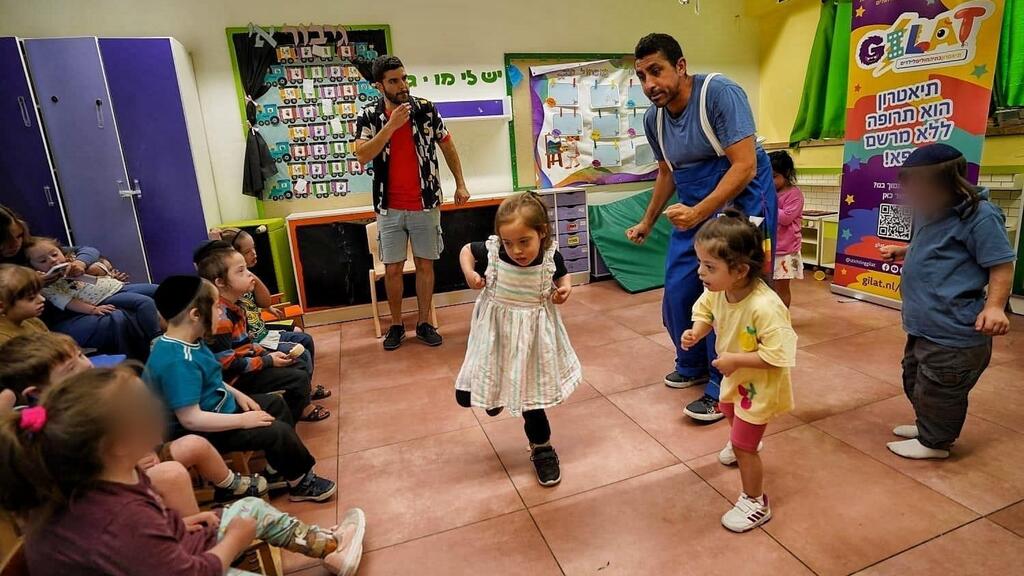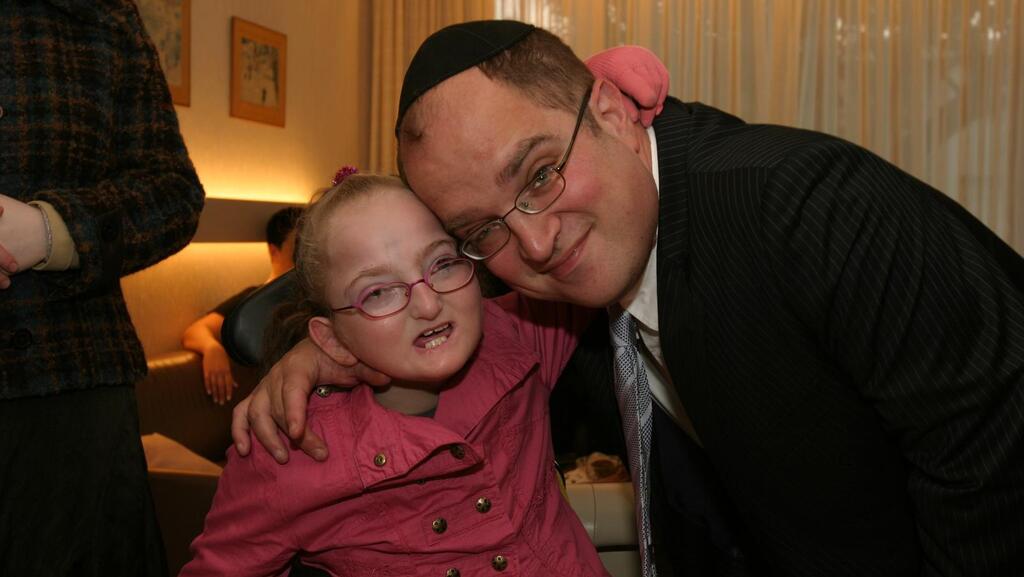Getting your Trinity Audio player ready...
The children’s smiles lit up the popular restaurant in Jerusalem, a rare sight after months of multifront war in Israel. These children face daily struggles, whether born with disabilities, injured in attacks, or affected by ongoing conflict.
Pitmaster restaurant hosted an event to raise awareness and support for the Gilat Foundation, which uses theater to bring joy to sick children.
6 View gallery
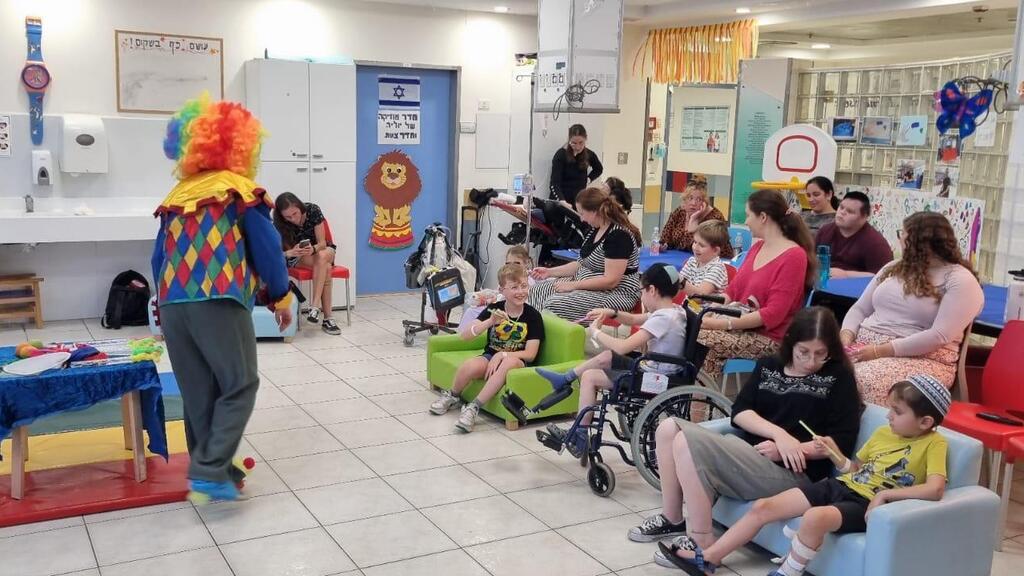

The Gilat Foundation, uses interactive theater to bring joy to sick children
(Photo: Menachem Leff/Gilat Foundation)
Founded in 2023 after the October 7 massacre, the Gilat Foundation launched its program in Israel and is now active in four hospitals: Shaare Zedek Medical Center, ALYN Hospital, Shalva National Center, and the Kerem Institute. Around 4,000 children have participated, and four more hospitals, starting with Hadassah after Sukkot, are set to join this year.
The Gilat Foundation was established in memory of Gilat Eisenmann, who passed away in 2008 at age 11 after spending much of her life in the hospital.
Gilat’s cousin, Shlomi Eisenmann, told The Media Line, “What’s truly remarkable is that despite those years of sorrow, her parents found the strength to create something positive. They started an organization to help kids just like her.”
He explained why therapeutic theater became a central part of the initiative: “Theater was Gilat’s passion. Even though she was physically impaired, mentally, she was sharp as a knife. She was always aware of everything going on around her. People would visit her, and she’d say, ‘Why are you sad? Be happy. Everything is fine.’ That was her thing. Even in the face of her challenges, she lifted everyone around her.”
6 View gallery
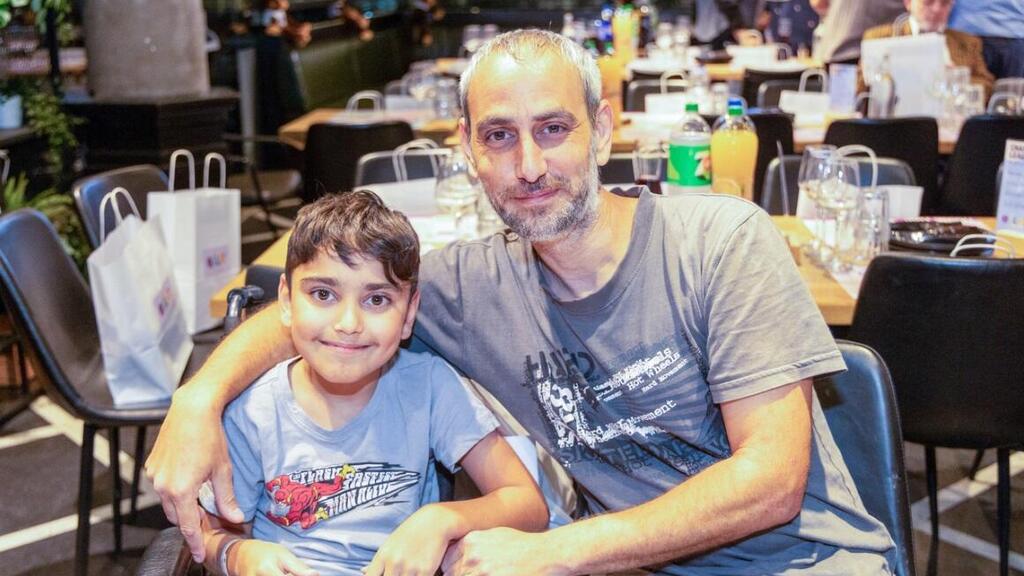

Yaheli Aviad and his father, Maor, at the Pitmaster restaurant even
(Photo: Menachem Leff/Gilat Foundation)
When the war in Israel began, Shlomi said Gilat’s parents felt compelled to act. “They rushed to Israel because they realized it was necessary. Many kids were injured or became clinically ill from the attack, and others, already sick, had to be moved to the center of Israel. These children, already in vulnerable situations, had to deal with even more upheaval. It’s tough. That’s why offering them therapeutic theater every week, giving them a space to feel like normal kids, is so vital.”
He emphasized the program’s measurable impact: “One of the heads of education at Alyn Hospital told us that in just two months since the start of the war, she saw an 80% increase in the children’s well-being. That’s a real, measurable result.”
Shlomi described the unique power of theater: “Theater is medicine no doctor can prescribe. You can’t buy it in a supermarket or a pharmacy. We organize everything—bring the kids out of their rooms, even when they don’t feel like moving. Once they come to the show, it changes everything. It’s an hour where they can forget their struggles, and that’s something invaluable.”
Tali Eisenmann, president of the foundation and Gilat’s mother, told The Media Line that she had wanted to be a doctor since childhood, which later influenced her decision to become a medic.
“But it didn’t work out. My father said to me, ‘It’s not a study for a religious girl,’ and I was used to listening to him, so I didn’t do it—and I regret it.”
“After Gilat passed away, I still thought maybe I’d be a doctor because I saw how important it is, but I didn’t do it. It was too much; I couldn’t handle it. When we came to Israel, I thought, ‘I want to be a medic.’ So in that, she didn’t really play a role, but what she does play a role in is my approach to people,” Tali shared.
“I’ve learned it’s very important to approach not only the patient but also the people surrounding them because when someone is chronically ill, it’s not only the patient who suffers—it’s the whole family,” she explained.
“I also learned that just because someone is in a wheelchair or disabled, it doesn’t mean they can’t answer, can’t think, or that they’re not normal. You should approach the person directly, even if they have learning difficulties or are mentally disabled—they’re still a person and deserve to be treated like one,” Tali said.
Yossi Zecharia is a father of four. His 8-year-old son, Lior, was born with a leg malformation—one leg is shorter than the other. Yossi told The Media Line that Lior has already undergone eight surgeries and will require additional ones nearly every year until he turns 18.
The theatrical performances raise Lior’s spirits and give him a moment to forget he has a disability. Lior looks forward to when the actors come to ALYN Hospital to perform. It makes him happy they come to perform, particularly when the children are involved in the play.
6 View gallery
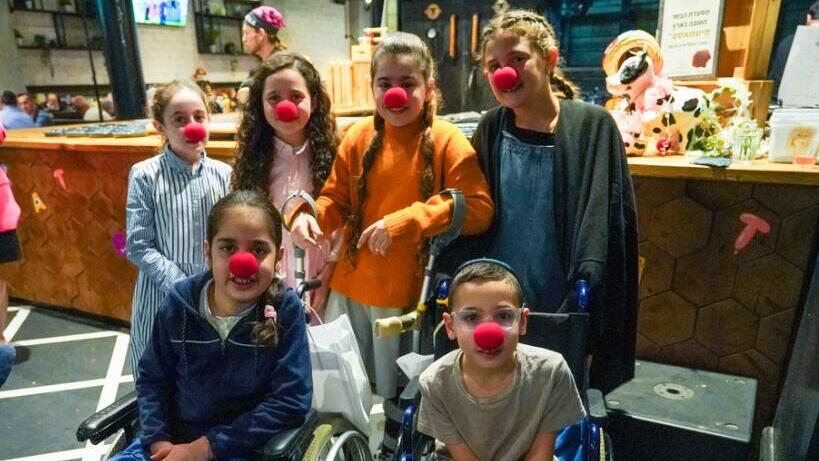

Most importantly, theater brings happiness to the children's faces
(Photo: Menachem Leff/Gilat Foundation)
Mahdi Haruv has worked in ALYN Hospital’s rehabilitation department for five years as a teacher and playroom coordinator.
Haruv speaks with passion and pride about the impact of the Gilat Theater on children from all backgrounds. As an Arab Israeli from the Shuafat neighborhood in East Jerusalem, he sees the Gilat program as not only a way to empower patients but also as a place where they learn values and gain a broader understanding of the world.
“The children learn about themselves, get a more positive sense of self, they learn how to be more patient with themselves, with their families, so they can see and be seen in a positive manner. Gilat shows them what they can do in order to be part of society,” Haruv told The Media Line.
According to Haruv, many children experience anxiety attacks during their recovery process. Rehabilitation helps them understand their emotions, and the interactive theater program teaches them how to cope with distress and reduce long-term stress.
“Most importantly, theater brings happiness to their faces,” he said.
These children are also learning about the world beyond the hospital, with the program teaching them about countries on every continent.
6 View gallery
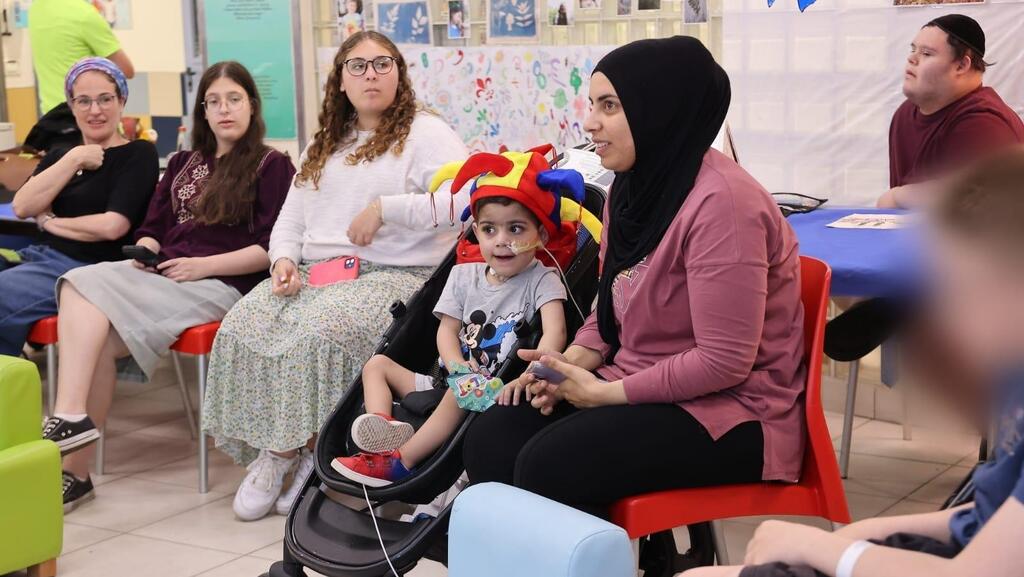

Mahdi Haruv of ALYN Hospital’s rehabilitation department says Gilat teaches values and respect to the patients and families who come together during the performances, regardless of their backgrounds
(Photo: Menachem Leff/Gilat Foundation)
The restaurant was packed, and Gilat’s name appeared on large TV screens, placemats, and goody bags. The video playing showed Gilat, a confident young child of 11, who beamed.
The joyful atmosphere gave way to the somber reality of war, reflecting the heart-wrenching emotions many have experienced. Zvi Steinfeld, a partner and chef at Pitmaster, is known for captivating guests with his culinary skills.
The Gilat videos on screen suddenly turned to Ben Shimoni and Gaya Chalifa, who had worked at the Petach Tikvah branch.
Steinfeld told The Media Line that they were at the Nova Festival on October 7. Shimoni managed to escape three times, each time bringing others to safety.
On his third escape, he took Chalifa and three others with him. On their way out, they were ambushed by terrorists and killed, Steinfeld shared.
“I worked together with both for nearly two years. We spent many afternoons and nights working side by side. After the services, we would often sit to catch our breaths, discussing anything that evening service to our lives and future plans. They were both incredible young, beautiful people who had a bright future ahead of them that was taken too soon,” Steinfeld said.
While the war has heightened stress nationwide and deepened the divide between Israelis and Arabs, Haruv remains hopeful.
“Gilat has taught values and respect to the patients and families who come together during the performances,” says Haruv. “They are all treated equally, no matter if they are religious or secular, Jew or Arab.”
“At this critical time of war, Gilat gives something important to the state that will help the entire country. It’s an opportunity for peace,” he says. “If sick kids can play together during war, and then their parents come together, it’s a recipe all can learn from.”
The story is written by Felice Friedson and Veronica Nefakh and reprinted with permission from The Media Line.
Get the Ynetnews app on your smartphone:



